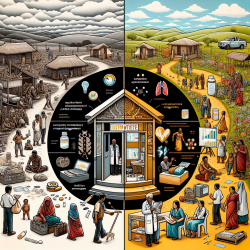Introduction
Conducting health research in rural areas presents unique challenges that require adaptive strategies to ensure the collection of reliable data. The research article "Conducting health survey research in a deep rural South African community: challenges and adaptive strategies" provides valuable insights into overcoming these obstacles. This blog explores the key findings of the study and how practitioners can apply these lessons to improve their skills and outcomes.
Key Challenges in Rural Health Research
The study identified four primary challenges encountered during field research in rural South Africa:
- Scarce Research Capacity: Limited availability of skilled local researchers necessitated creative capacity-building approaches.
- Staff Relocation Tensions: Integrating relocated and local staff required careful management to prevent tensions and foster teamwork.
- Logistical Constraints: Geographic isolation and poor infrastructure demanded innovative logistical solutions.
- Community Buy-In: Gaining the trust and cooperation of local communities was essential for successful data collection.
Adaptive Strategies for Success
To address these challenges, the researchers employed several adaptive strategies:
- Capacity Building: Training local individuals and partnering them with experienced staff helped develop necessary skills and fostered local engagement.
- Team Cohesion: Facilitating open communication and team-building activities helped resolve tensions and promoted collaboration.
- Utilizing Local Knowledge: Engaging local drivers and community guides improved logistical efficiency and navigation.
- Community Engagement: Regular meetings with community leaders and ongoing dialogue ensured community support and participation.
Implications for Practitioners
Practitioners can enhance their research and service delivery by incorporating these strategies:
- Invest in local capacity building to create sustainable research and service delivery teams.
- Foster team cohesion through regular communication and team-building activities.
- Leverage local knowledge and partnerships to improve logistical planning and community engagement.
- Prioritize community buy-in through transparent communication and respect for local customs and leadership.
Encouraging Further Research
While the study provides valuable insights, further research is needed to explore additional strategies and contexts. Practitioners are encouraged to document and share their experiences to contribute to the growing body of knowledge on rural health research.
To read the original research paper, please follow this link: Conducting health survey research in a deep rural South African community: challenges and adaptive strategies.










